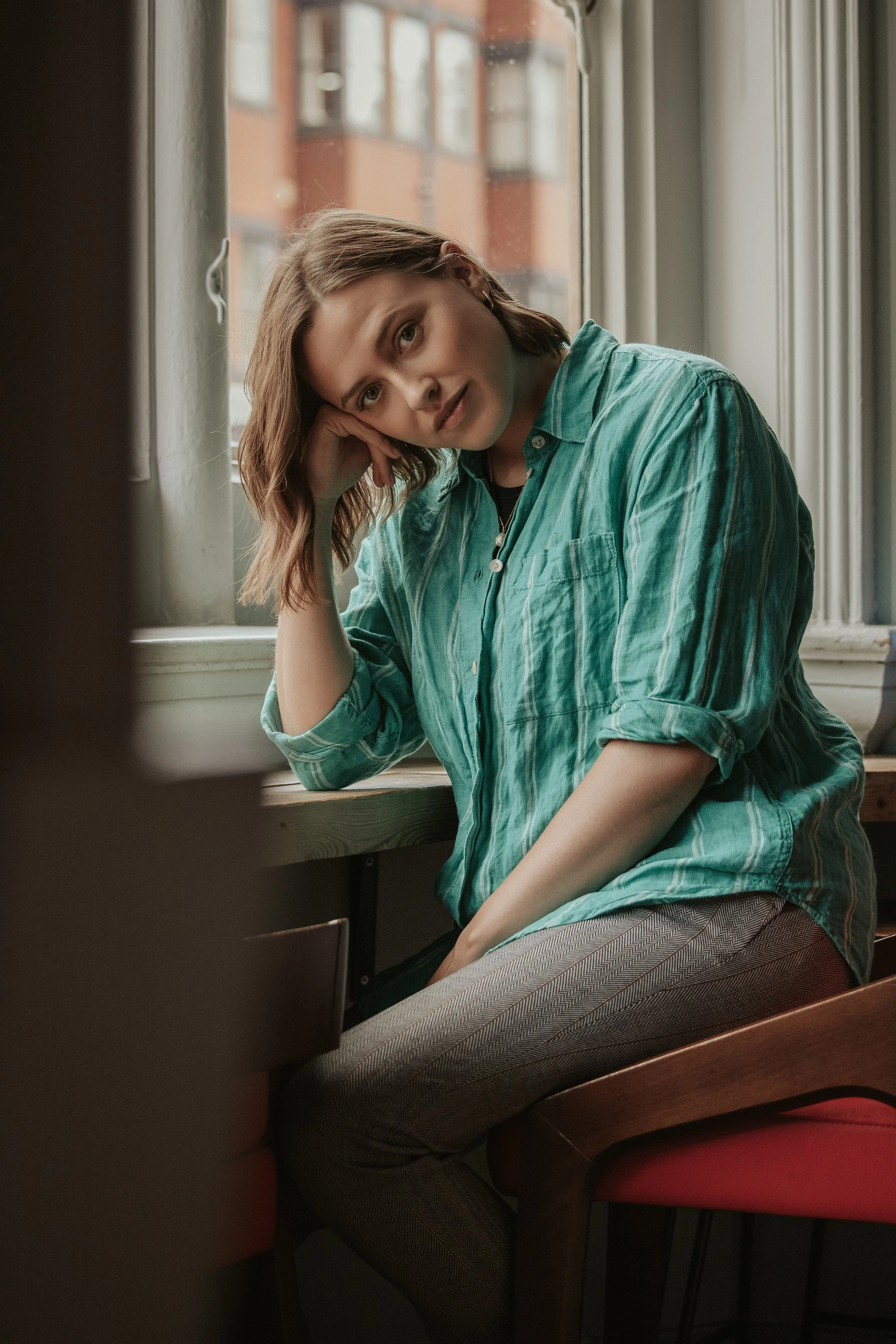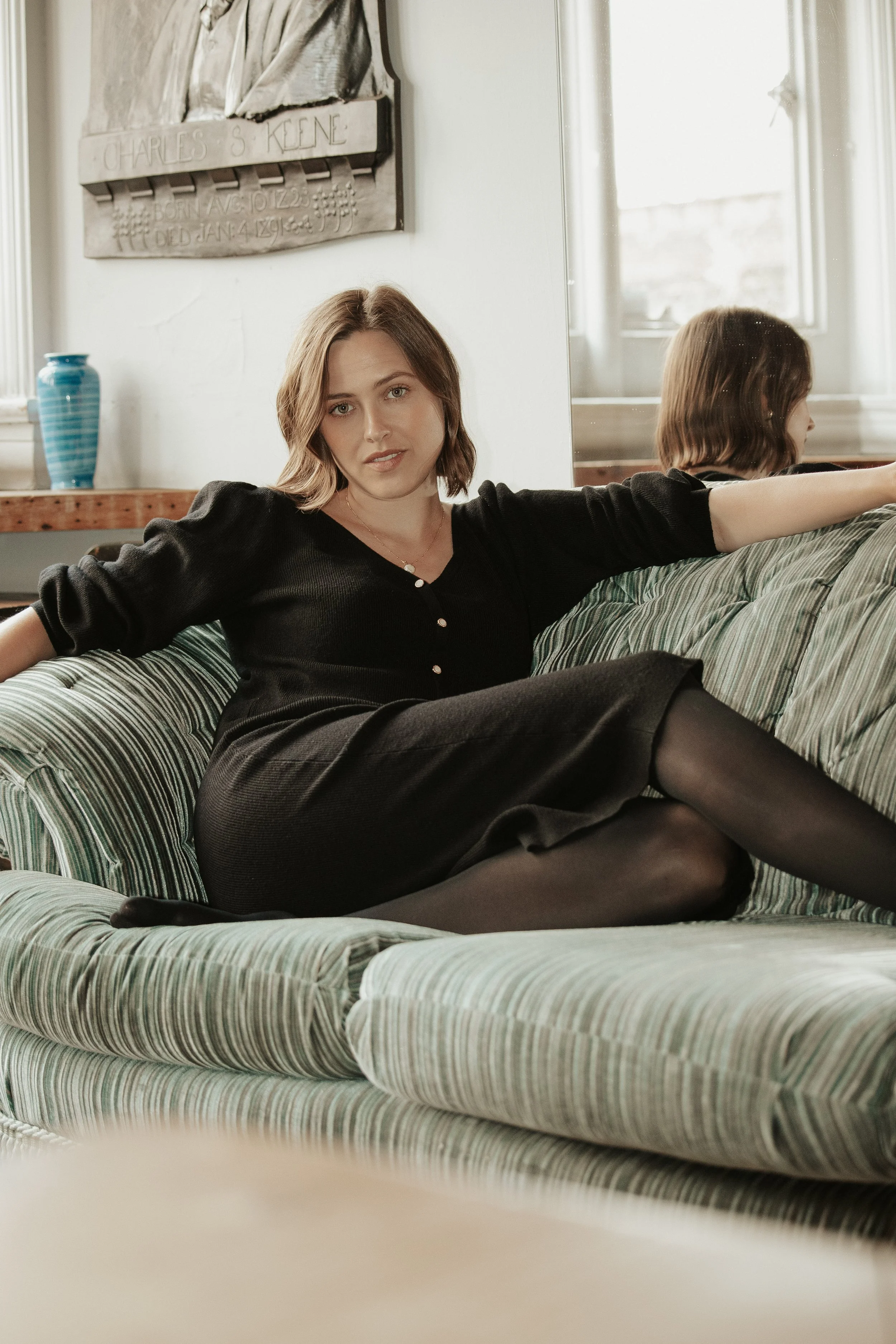Elinor Crawley
Actress Elinor Crawley begun her career in Richard Ayoade’s cult classic film Submarine, and most recently has returned home to Wales to star in the true-life drama series Steeltown Murders. She tells us about how she approaches playing real people, the best set she’s been on and going to LAMDA.
How long have you been acting, and when did you know it was something you wanted to pursue?
I joined a drama group in Cardiff, which used to be ITV’s kind of youth studio, so they focused on TV and film. It had a bit of a reputation of being a good place for young Welsh talent, so occasionally casting directors would come around and use it as a resource. I really enjoyed going - we didn’t put on shows or anything as it was for screen acting, so we did a lot of acting things out and watching them back, which ironically is all you ever do as an actor now with self-tapes! Through the workshop I started to get a little bit of work here and there, and eventually I was cast in the film Submarine by Richard Ayoade, and it was after doing that, I was about 16, 17 at the time, that I thought “You’re gonna really regret it if you don’t go for this. You’ve got to give it a shot, as terrifying as it is!”.
Was Submarine your first professional role? How was that experience, and working with Richard?
Yes, I’d say it was. I’d done a few things for, like, Cardiff Castle, but Submarine was my first proper job. It just felt like magic, partly I think because it was my first proper experience on set, and some of my friends from the same workshop I’d been to were in it - Craig Roberts and Darren Evans - so I was really lucky. I was kind of clueless, when people would be talking about things like call sheets and sides I could go “What’s that?” to my friends. It was the best - when I look back on it now it was just so fun. And Richard is the most unique man I’ve ever met - I’ve never worked with a director like him since. He could be painfully shy - he’d sort of scuttle on set between takes, whisper a few notes to whoever and go off again. But he always had this running monologue of hilarious observational comedy, of what was going on.
Where did you go from there? Did you find any setbacks being based in Wales?
I am quite lucky in the sense that I was based in Cardiff - my mum and dad are English but met in Wales and I was born there - and it’s only a two-hour train to London. I also had this amazing mentor from the workshops, Pete Wooldridge who could guide me in those early steps, even to the extent of helping me during the process of getting a London agent. By the time I left school I had the agent, and she’d send me up to London on the train for auditions, and actually it was really do-able. It was only a few years later that I moved to London because I like it - and my mates are here! I was really fortunate in the way it played out in the early stages, and as anybody in this industry knows you’ve got to keep pushing - there were loads and loads of nos, but there was always something in me that kept “You’ve got to keep going”.
When did you move to London?
About 2014/15, I think. I’m close to Kingston upon Thames at the moment, but I’ve been all over - I’ve lived in Shadwell, Arnos Grove at the end of the Piccadilly line, I was in Chiswick for a little bit…
You’ve recently starred in the BBC series Steeltown Murders, which was shot in Wales - what was it like to return home?
I was actually able to stay with my parents while we filmed that, which was nice - and I adore working in Wales! We shot in November last year, but my dates on set were spread out over a month. We also had the dreaded Covid intervene, which slowed things down for a little while!
Your character in the show, Karina Bethell, is a real person - do you approach playing real people differently to fictional characters?
Yes and no. I think yes in that you’ve got a whole history to learn, you don’t have to make it up. I was lucky enough to sit down a couple of times with the real Karina, who’s amazing, an absolute powerhouse of a woman. But also because Marc Evans, our director, was hellbent that we weren’t doing “impressions” of who we were portraying, I had a similar creative freedom as when playing a character completely made up. There’s always a kind of instinct around a character, I find, when first looking at them, a gut feeling about them, and then I link up why that might be, because of their history etc. But in this scenario it was the other way around - I had that instinct about her, and I also had the real history, which kind of matched up.
Have you played any other real people?
In The White Queen I played Princess Cecily - obviously I didn’t get to meet her as much as I’d have liked to! I had historical info, dates, but that felt way more distant, I had a lot more to fill in there.
You’ve also been in the show Vikings, a huge production - how was that experience?
That is certainly the largest-scale production I’ve done - everything about it was epic, everything felt like you were a kid playing in the best playground ever! You’d walk onto set and it’d be this big Viking village they’d built, and it’d have chickens running around and sand put down next to the lake to make it look like the sea, and they built this whole Viking camp for a festival… It was just incredible. And stunning locations - it was filmed in Ireland, in the Wicklow mountains, south of Dublin. Unbelievable scenery, I’ve never seen anything like it. Actually it’s a shame I was so young when I did that - I was about 21 at the time, and I was terrified of being on a set that scale!
What specifically jumps out to you in a script or a character?
I love reading characters who have a bit of grit about them, especially if they’re a bit of a fuck-up, if they have a great sense of humour. A lot of characters feel a bit squeaky-clean sometimes, or they’re kind of feisty yet vulnerable, and I do find that’s changing a little bit, but it’s a real breath of fresh air when something breaks away from that. There’s loads of genres I’d love to do something in that I haven’t yet - I’d love to do something sci-fi, otherworldly. And I’d love to do more comedy.
At the beginning of the year you did a play, The Winston Machine - what was that about?
It was based on this idea of what happens when there’s no war left to fight. It was devised by Kandinsky Theatre Company - they realised that there’s still this massive fascination with World War II in the UK, how generations who had nothing to do with it hold it up, and it gets brought out in all these political fights, Covid got likened to it… There’s this whole war memorial under Westminster, and they had an idea of that there’s this kind of “brain” under Britain obsessed with war. The character I played, Becky, is really into all the war memorial, reenactment stuff, she’s a singer, she sings all the old war songs, and she kind of romanticises her grandparents’ love story, as they met in the war. It was super interesting, there were many layers to explore.
You recently graduated from LAMDA - what spurred your decision to go to drama school as an established actor?
There were a few reasons really - predominantly, from moving to London I fell in love with theatre, and I hadn’t had much exposure to it back in Cardiff. I realised I loved it, and I realised I didn’t have the skills for it. I’d never trained at a drama school, I’d never had that peer group you get with it - a lot of my friends are from various jobs and they’re all scattered around the country, so I’d never had that situation of being in a “gang” if that makes sense, and there was something in me that really wanted to feel what was like. So I went to LAMDA for two years and it was a whirlwind - we had Covid to contend with so a bit of it was on Zoom, but the experience was amazing and I got so much out of it. I feel a million times more equipped to be in the industry - before I felt like I was sort of making a stab in the dark.
What advice would you give to untrained actors who feel similarly?
I think I would encourage some sort of training - and I say that with the caveat that it can be so inaccessible and expensive to go to a drama school, so I think it can be just as valuable to go to classes and workshops. I think having that group dynamic - what I found with LAMDA was that it was like a readymade group of creators, and it does something to your soul, you get to know people who also want to write, want to create, which is just so good to learn from. So yes, I would tentatively encourage some sort of training, but drama school can be horrendously inaccessible!
Are you auditioning for much theatre now?
A mixture of theatre and screen work. Unfortunately one pays a lot better than the other, and we’re ill in a world where we need to make a living, so it’s not realistic to be going for just theatre at the moment. So both, really.
How do you manage being a working actor with diabetes?
As well as any diabetic in any job I guess! Type 1 diabetes can feel like a full-time job in itself and can feel particularly demanding on a set or on stage when you have far less attention to give it. I'm really lucky that I do have access to tech that helps immensely. Sadly this isn't the case for everyone in the UK. For the last couple of years I have used a DIY system which links my insulin pump to my blood glucose monitor via an app on my phone which I had to build myself. It's called looping and there's a few ways of doing it, but this particular system was created by a man named Milos Kozak who shared the instructions online, and now thousands of people across the globe are doing it. It is a complete game changer. It's as close as you can get to a bionic pancreas... for now!
Words: Scott Bates
Photos: Amelia May
Follow Elinor on Instagram and Twitter
Elinor’s necklace is from Antonia Guise Jewellery


